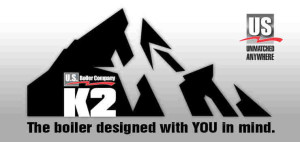Not all boilers are created equal. Reading consumer and contractor reviews can help narrow down your decision. So can checking AFUE efficiency ratings and ENERGY STAR® certification on the residential boiler you have in mind. Another good source for accurate information about heating systems is your local plumbing and heating contractor.

Manufacturer websites, such as ours at U.S. Boiler Company, are another excellent resource for information. We provide extensive information for consumers and contractors about our large line of hydronic heating products, including water boilers, steam boilers, hot water heaters, and radiators. You will find product data sheets, brochures, and user and installation manuals.
Shopping for a New Residential Boiler
There are several types of residential boilers available, including high-efficiency systems designed to help you control high heating costs. If your heating system is over 10 years old, switching to a newer system may substantially reduce your heating costs. These steps will help you choose the appropriate heating system for your home.
- Boiler Type: While a furnace heats air for warmth, a boiler or hydronic system heats water, most commonly with gas or oil. Gas boilers can typically be fueled by either natural gas or liquid propane with a simple modification. Oil-fired boilers are a popular choice in areas of the country where access to natural gas is limited. Condensing boilers are extremely energy efficient because they operate at lower temperatures than conventional systems, but still provide abundant heat. These boilers use less energy and fuel and keep more heat in the heating system.
- Boiler Size: To properly design a heating system for your home, your heating contractor will need to know how much space there is to heat. A bigger boiler is not always better because it could consume more fuel than necessary for the size of your home and cause you to pay too much for heat. A boiler that is too small won’t be able to effectively heat your home. The contractor will look at your home’s construction, type and number of windows and doors, the quality of your insulation, and the home’s total heat loss value to determine the correct boiler size.
- Ratings and Certification: Whether they are gas or oil boilers, ENERGY STAR® certified boilers use about 7% less energy than standard boilers. They have annual fuel utilization efficiency (AFUE) ratings of 85% or greater, exceeding the federal minimum standard for energy efficiency set by the U.S. Environmental Protection Agency. AFUE is how heating equipment efficiency is measured. An AFUE of 90% means that 90% of the fuel energy becomes heat for your home and the other 10% escapes up the chimney and elsewhere. The higher the rating, the greater your savings will be. U.S. Boiler’s most efficient hydronic systems are our high-efficiency Alpine™ gas-fired condensing boiler and the new K2™ condensing gas boiler, which are both ENERGY STAR®-certified. The Alpine™ has a 95% AFUE rating and K2™ has a 94% AFUE rating.
- Warranties: At U.S. Boiler, we’re so convinced of the performance of our Alpine™ and K2™ condensing gas boilers that we offer a free standard extended warranty plan that provides parts and labor for the boilers and their controls for 3 years. Warranties on traditional cast iron water boilers offer one year coverage for parts, and a lifetime limited warranty on the heat exchanger. Warranties are different for steam boilers. Reviews, ratings, certifications, and recommendations from your professional heating contractor will help you choose the right residential boiler for your home to reduce your energy costs.
